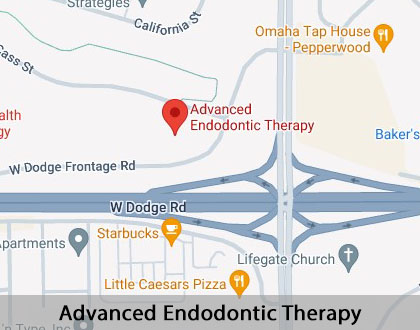Emergency Endodontist Omaha, NE
An emergency endodontist is trained to diagnose and treat tooth pain. Their role is to alleviate the pain, manage any infections, and reduce the need for patients to head to an emergency room for treatment. Severe dental pain or dental infection symptoms often require the services of an emergency endodontist. A dental emergency that requires an endodontist typically involves a tooth infection or trauma.
Emergency endodontic care is available at Advanced Endodontic Therapy in Omaha. Call us at (402) 506-7111 if you need immediate care.
Endodontist vs. ER
When facing a dental emergency, it is best to avoid the emergency room, with some exceptions. Most emergency rooms are not equipped to handle dental issues and often refer a patient to an endodontist for treatment. However, if there has been trauma that requires additional medical treatment, or if the situation is life-threatening, the ER should be the first stop.
Endodontists have the training and equipment necessary to handle dental emergencies. A patient with a serious cavity that progresses into an infection can seek treatment from an emergency endodontist. In the event of a tooth injury such as a crack or large chip, patients should seek an endodontist instead of the ER.
“When facing a dental emergency, it is best to avoid the emergency room, with some exceptions.”
Common Dental Emergencies
There are a few common dental emergencies. One thing most of them have in common is pain. A toothache can indicate several conditions. While more minor toothaches may not need emergency treatment, it requires more immediate attention if the toothache includes symptoms such as swelling or fever.
Additional common dental emergencies include chipped or broken teeth, broken crowns and fillings, and infections or an abscess near the root of the tooth or the gums. Infections can be serious, especially if left untreated. Some warning signs that indicate the need for emergency endodontic care include:
- An abscess along the gum line
- A tooth that is sore to the touch
- Fever
- Pain while chewing
- Sensitivity to hot and cold food and drink
- Swelling, discoloration, or blood
- Throbbing or stabbing pain in or near a tooth
“While more minor toothaches may not need emergency treatment, it requires more immediate attention if the toothache includes symptoms such as swelling or fever.”
What to Do in a Dental Emergency
Before seeing the endodontist, there are a few steps people can take at home during a dental emergency. In the case of a broken tooth, look for the tooth fragments and gather any to take to the appointment. Next, clean the injured area with warm water and place a cold washcloth over the site. If there is any bleeding, use gauze, cotton balls, or a paper towel to help absorb it.
People who are suffering from a toothache can rinse their mouth with warm salt water to clean it. Then, place a cold compress or ice pack on the cheek near the affected area to help reduce swelling. Over-the-counter pain medication can also help to relieve some discomfort.
Trauma to the mouth may require more immediate medical attention. If the injury is life-threatening, a visit to the ER may be necessary. Otherwise, try to stop any bleeding and keep the injured area as still as possible.
“Before seeing the endodontist, there are a few things that can be done at home during a dental emergency.”
Check out what others are saying about our dental services on Yelp: Emergency Endodontist in Omaha, NE
Finding an Emergency Endodontist
There are several ways to find an emergency endodontist. The American Association of Endodontists offers a search tool on its website to assist in finding a licensed provider in the area. This includes whether or not the provider offers after-hours or same-day appointments to treat a dental emergency.
Friends and co-workers are also good resources when looking for an endodontist. Ask around and see who they recommend. A Google search will also provide a list of providers along with reviews and comments. A patient's general dentist often has a list of recommended providers as well.
“There are several ways to find an emergency endodontist.”
Questions Answered on This Page
Q. Why should I go to an endodontist instead of the ER for emergency dental care?
Q. What are some common dental emergencies?
Q. What can I do at home during a dental emergency?
Q. How do I find an emergency endodontist?
Q. Why is follow-up care important?
People Also Ask
Q. What are the signs you need an emergency root canal?
Q. Why is aftercare important following dental trauma?
Q. What happens when an abscessed tooth goes untreated?
Q. What are the symptoms of reversible and irreversible pulpitis?
Q. What makes an endodontist the best person to save a knocked-out tooth?
Follow-Up Care
Following emergency dental treatment, follow-up care is critical to aid in recovery. Patients will have instructions on how to manage their pain and to care for their tooth post-procedure. There may be some soreness in the area for a few days as things begin to heal. Ignoring any follow-up care instructions could delay healing.
A follow-up visit will often be needed to check on the healing process and ensure there have been no setbacks. If the endodontist performed an emergency root canal, the patient would likely need to return to have the tooth restored with a permanent crown or final filling. If there is severe pain or pressure over several days, swelling, or the temporary crown or filling comes loose, it is important to return to the endodontist immediately.
“Following emergency dental treatment, follow-up care is very important to aid in recovery.”
Frequently Asked Questions
Q. What is an endodontist?
A. An endodontist is a dental professional who has completed an additional two or more years of specialty training. This training included all aspects of root canal therapy. They also diagnose and treat complex causes of tooth pain.
Q. Do I need emergency dental care from an endodontist?
A. It is best to seek out emergency dental care from an endodontist instead of going to the emergency room. An ER is not equipped to handle most dental emergencies. People who are experiencing sudden and severe tooth pain that seems to worsen should seek an emergency endodontist.
Q. What should I expect during my appointment?
A. An emergency endodontist will likely be able to see you fairly quickly. An examination of the mouth will be done along with X-rays to help identify the source of the pain. Once a cause has been determined, the appropriate course of treatment will begin to help relieve the pain.
Q. What can I do to avoid an endodontic emergency?
A. While not all emergencies can be avoided, some things can be done to prevent future problems. Maintain good dental hygiene and visit the general dentist regularly for cleaning and preventative treatment. Avoid eating foods that can chip or crack a tooth.
Q. Do I need an emergency root canal?
A. There are several common signs that an emergency root canal is needed. They include intense pain, pus coming from the tooth, damage from trauma, and tooth discoloration. People who are experiencing those symptoms should call an emergency endodontist.
Start Feeling Better – Visit Us Today
By visiting us as soon as possible, our team can help get you the professional treatment you need. Instead of waiting around and allowing the symptoms to get worse, we can provide you with treatment options.
Definitions
Choose an Endodontist for a Dental Emergency
An emergency endodontist can provide relief from pain and discomfort and help reduce the risk of complications in the future. Even if you are not sure you are experiencing a dental emergency, it is better to call and speak to someone in our office. Call Advanced Endodontic Therapy at 402-506-7111 for more information.
Helpful Related Links
- American Association of Endodontists. Abscessed Teeth. 2024
- American Dental Association. Medical Emergencies in the Dental Office. 2024
- Cleveland Clinic. Avulsed Tooth. 2024
- Healthline. Cracked Tooth. 2024
- MedlinePlus. Root canal. 2024
- National Library of Medicine. Orthodontic Extrusion: Guidelines for Contemporary Clinical Practice. 2024
- ScienceDirect. Vertical root fracture: a case report and review of the literature. 2024
- Verywell Health. What Dental X-Rays Are Used For. 2024
About our business and website security
- Advanced Endodontic Therapy was established in 2008.
- We accept the following payment methods: Cash, Discover, MasterCard, and Visa
- We serve patients from the following counties: Douglas County, Dodge County, Lancaster County, and Sarpy County
- We serve patients from the following cities: Omaha, Benson, Florence, Bellevue, Fort Calhoun, Papillion, Lincoln, Bennington, Plattsmouth, Fremont and Elkhorn, Missouri Valley, and Council Bluffs
- Norton Safe Web. View Details
- Trend Micro Site Safety Center. View Details
Back to top of Emergency Endodontist










